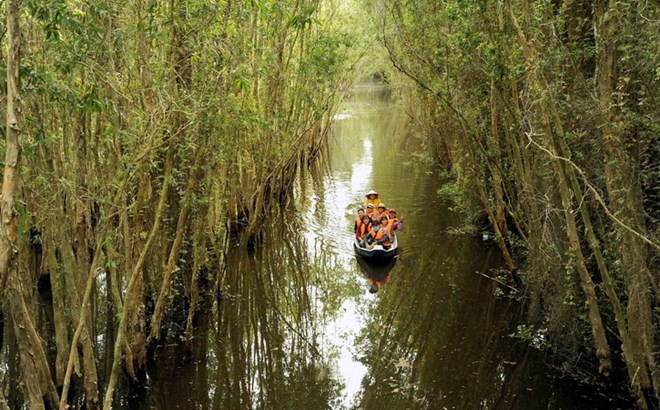
Deputy Minister of Natural Resources and Environment Le Cong Thanh has underlined the need to focus on the planning and investigation of water resources across the country, especially in the Mekong Delta region.
A mangrove forest in Long
An (Photo: VNA)
Speaking at a recent meeting
in Hanoi, the
official proposed amending and supplementing the Law on Water Resources from 2020 in order to improve
the management of sustainable exploitation and use of water resources.
Hoang Van Bay, head of the Department of Water Resources Management, said his
department has prioritised the inspection of the operation of reservoirs, the
planning of basic investigation of water resources nationwide, the building of
a surface and underground water monitoring and managing system, and the listing
of cross-border and inter-provincial water resources.
In 2019, the department will review the implementation of the Law on Water
Resources in 2012 in
preparation for the programme on building, amending, and supplementing the Law
on Water Resources from 2020, while setting forth technical regulations in the
sector.
Nguyen Xuan Truong, head of the Department of Planning and Finance under the
Ministry of Natural Resources and Environment, said it needs to put into
consideration a number of tasks and sectors, especially those regarding the
amendment and supplementation of the 2012 Law on Water Resources.
Another task is to detail the items of planning schemes relating to rivers and
budget, he added.
The Vietnam National Mekong River Commission (VNMRC) will begin to perform its
functions and tasks as a commission for the Mekong,
Sesan, and Srepok river basins in 2019, according to Le DucTrung, chief of the
VNMRC office.
The commission will also investigate, collect, and update data on water
resource exploitation and use it to make plans to improve the environment in
the Mekong River Basin and the socio-economic
conditions of the Mekong Delta.
At the same time, it will continue to coordinate with member countries of the
Mekong River Commission (MRC) to realise the joint statement on providing
consultations for the Pak Beng hydropower project and offer consultations to
the Pak Lay hydropower project of Laos.
The commission will join hands with the MRC to propose joint studies on the
basis of outcomes of the research on sustainable management of the Mekong River
Basin, including the impacts of mainstream
hydroelectricity plants, he said.
Source: VNA
More than just an information technology teacher, Bui Van Nien is an inspiring figure who has nurtured the scientific curiosity and creative spirit of students in Vietnam’s ethnic minority communities.
Da Bac is the most disadvantaged mountainous district in Hoa Binh province, with ethnic minorities accounting for about 90% of its population. Over the past years, the district has mobilised resources to implement ethnic policies to improve the quality of life of local people.
In recent years, Hoa Binh province has consistently prioritised the protection, care, and education of children, particularly those from ethnic minorities and disadvantaged backgrounds, by creating a safe, healthy, and nurturing environment for their all-round development.
The Steering Committee for Tobacco Harm Prevention and Control of Hoa Binh province, in coordination with the Tobacco Harm Prevention and Control Fund, held a ceremony on May 28 in response to the World No Tobacco Day (May 31) and the National No Tobacco Week (from May 25 to 31). The event was chaired by Nguyen Van Toan, Standing Vice Chairman of the provincial People’s Committee and head of the Steering Committee.
Since 2021, the Center for Industrial Promotion and Industrial Development Consulting (CIIDC) under the Department of Industry and Trade has been implementing a school lighting model as part of the plan for using energy efficiently and economically in Hoa Binh Province in the pẻiod of 2021 - 2025. This model not only aims to improve the learning conditions and enhance the education quality, but it also promotes the message of energy saving, energy security, environmental protection and contributes to the goals of socio-economic development.
In the 2024 - 2025 school year, the entire Hoa Binh provincial education sector includes 520 educational institutions and schools. Among them are 13 ethnic boarding schools with 153 classes and 4,487 students. Four of these schools have met national standards, reaching 30.7 percent.



